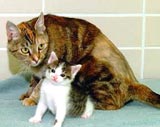
Meet
Cc - a cute ball of fur with the controversial distinction of being
the world's first cloned cat.
To the joy and consternation of animal lovers, her birth could
lead to a new industry, the large-scale cloning of pets.
Cc, the carbon copy cat, was created by a team at Texas A&M
University with the backing of an American businessman, John Sperling,
whose company plans to offer cloning to cat and dog owners.
Mr Sperling has put $US3.7 million into cloning research in the
hope a copy can eventually be made of his aging long-haired dog,
Missy.
Carlie Martin, of the Australian Association for Humane Research,
said the cloning of cats was an appalling development.
Other cloned animals had been found to have high rates of abnormalities.
And a favourite pet could never be replaced by a clone, because
each animal was an individual.
"It's just a money-making exercise," Ms Martin said.
Sheep, mice, cattle, goats and pigs have been cloned, Dolly-style,
by transferring the nucleus of a cell from an adult animal into
a hollowed-out egg.
The success rate with cats was as low as with these animals.
Cc, born two months ago, was the only live birth from 87 cloned
embryos that were implanted in surrogate mothers.
Cc was cloned from a cell taken from near the ovary of a tortoiseshell
cat, but she is not a carbon copy of her DNA donor. Her individuality
is obvious from her slightly different coat pattern.
The researchers said this was because the appearance of multi-coloured
animals depends not just on genetics, but on other factors during
their development.
(Agencies)
